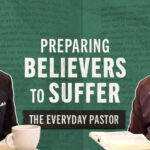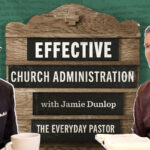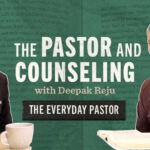Six years after their bestselling book, The Meaning of Marriage: Facing the Complexities of Commitment with the Wisdom of God, Tim and Kathy Keller have something new for us: a 365-day devotional for couples.
The Meaning of Marriage: A Couple’s Devotional contains a year’s worth of digestible devotions that draw from and expand on lessons introduced in the previous book. Tim and Kathy, who have been married for 43 years, offer stories, scriptures, and prayer prompts to enhance your relationship with both God and your current or future spouse. So whether you’re pursuing marriage, enjoying marriage, or struggling in marriage, get this devotional and let it help you—every day of the year.
I corresponded with Tim and Kathy about advice for dating couples, the beauty of complementarianism, counsel for parents in the little years, and more.
What does the gospel have to do with dating? How do you evaluate someone else to know if they are “good enough” for you while keeping a perspective of grace?
Tim: Obviously “dating” is a cultural category with a shifting definition. If you mean “marriage-seeking” (which we don’t think all dating has to be), then the gospel influences that in several ways. One is that the “best” Christians are ultimately the “chief repenters.” That is, they are quick to see and admit their faults unbegrudgingly and to seek forgiveness from God and others. This readiness to repent and accept forgiveness is perhaps the key “virtue” (if you can call it that) that you should be looking for in yourself and any potential spouse. If you both have it, then the sins and incompatibilities any two sinners will have cannot overthrow you. You’ll be able to grow in love for each other despite them.
Self-centeredness has existed since Genesis 3, but how does expressive individualism uniquely threaten Christian marriages today?
Tim: In the past every culture assumed that you found truth outside the self, either in God or tradition or some transcendent values, or in the good of your family and community. That meant we had some objective, external norms by which disputes between persons could be adjudicated. Now our culture says we find truth inside ourselves; we are told to “live our truth” and never sacrifice our happiness and inner desires for someone else. To do so is unhealthy at best—oppression at worst. Marriage, however, requires this kind of mutual sacrifice every single day. So it’s not surprising that both marriage and also child-bearing is in decline in our culture.
What should a spouse do when the other spouse is quick to apologize, but there is no true repentance (they continue in the same behavior patterns year after year)?
Tim: Being too quick to apologize can be a way for you to shut down your spouse, who has been wronged. It can be a way to prevent him or her from explaining the painful effect of your behavior. Recognizing that behavior could help you develop more genuine repentance. And genuine repentance is, to paraphrase Richard Sibbes, “not a little hanging down of the head, but a working of the heart until the sin itself is more odious to you than the consequences.” Real repentance allows your heart to feel how the sin has grieved God and your spouse. And that always leads to some change. If such change is not forthcoming, consider going to a pastor or counselor who can help.
What’s so beautiful about a complementarian marriage?
Kathy: All of God’s designs are beautiful—sometimes intricate, difficult to master, and affected by sin, but glorious nonetheless. In marriages that embrace God’s design, you both get to “play the Jesus role.” Husbands are told to imitate Jesus as the servant-leader, who will go to any length, even death, to serve and purify his bride (Eph. 5). Wives can look to Jesus as he was worshiped in Philippians 2—submissive to the role of ezer in full knowledge of her equality.
C. S. Lewis refers to this (without using the word “complementarian,” which wasn’t yet coined) as a dance. He acknowledged that, in order to avoid the oppression that sinners find so natural, it’s sometimes necessary to have unisex “employees,” “voters,” or “citizens.” But while it may be necessary at times to wearing the “uniform” of gender neutrality, it is necessary in the way medicine is necessary—it is not food. For the best place to find Lewis’s extended musings on the glories of gender roles, go to the coronation scene in Perelandra. And for more musing on that, see Christy Raj’s website.
What advice would you give parents of young kids who are struggling to grow their marriage amid the chaos of the little years?
Kathy: The best practice I’ve heard of I learned recently from a young couple with several preschool children. They set aside 9–9:30 p.m. every night (even by phone) as “Talk Time.” Not for argument or household business, but talk. “What are you thinking? How are you feeling? What’s going on with you and God? Tell me your heart.”
It has been, in their words, a game-changer. Focused attention is what we all crave. We know we should give it to our children, but sometimes it fails to register as just as important to give to our spouse.
Life is busy, and our weeks are filled with activities. What daily and weekly habits do you two practice to ensure you are honoring God in your marriage?
Kathy: Years ago we began praying together as the last thing we did at night before sleep. Even if Tim is halfway around the world, he will call so we can pray. We don’t have a set agenda or length of time—sometimes it’s whatever is heavy on our hearts, or praise for mercies received, or whatever comes to mind. But we pray. You cannot come before God together with unrepented anger in your heart. In addition, we assist each other in our projects and ministries, counsel one another, and try to apply all the advice we give to others to ourselves!
Download your free Christmas playlist by TGC editor Brett McCracken!
 It’s that time of year, when the world falls in love—with Christmas music! If you’re ready to immerse yourself in the sounds of the season, we’ve got a brand-new playlist for you. The Gospel Coalition’s free 2025 Christmas playlist is full of joyful, festive, and nostalgic songs to help you celebrate the sweetness of this sacred season.
It’s that time of year, when the world falls in love—with Christmas music! If you’re ready to immerse yourself in the sounds of the season, we’ve got a brand-new playlist for you. The Gospel Coalition’s free 2025 Christmas playlist is full of joyful, festive, and nostalgic songs to help you celebrate the sweetness of this sacred season.
The 75 songs on this playlist are all recordings from at least 20 years ago—most of them from further back in the 1950s and 1960s. Each song has been thoughtfully selected by TGC Arts & Culture Editor Brett McCracken to cultivate a fun but meaningful mix of vintage Christmas vibes.
To start listening to this free resource, simply click below to receive your link to the private playlist on Spotify or Apple Music.












































